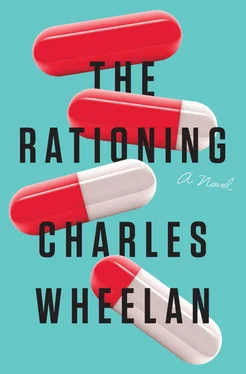“Neither do I. But if you don’t mind, I’d like you to sit in, just fifteen minutes or so.”
“Of course, Mr. President.”
There were pleasantries as the participants filed into the Oval Office. The President and the Majority Leader, taking advantage of a moment together, conferred briefly over some matter. The Majority Leader took a pen and small blue notebook from his breast pocket and made a small notation, a note to himself, presumably. The technology was so old that I found it striking at the time. “Okay, where are we on the lurking virus thing?” the President asked, trying to call the meeting to order.
“One minute,” his Chief of Staff said, looking at her phone. “Are we going to invite Prime Minister Abouali to the White House while he’s in D.C.?” She was a petite, athletic-looking woman with short dark hair that was going gray in streaks. She wore dark-rimmed reading glasses that she put on when she consulted her notes or her phone and then took off as she spoke to the President, almost like a nervous habit. She could have passed for a school librarian, albeit in a very well-funded school district.
“Sure. Why not?” the President asked.
“The Jordanians have asked that we not grant him a formal meeting,” the Chief of Staff explained. Her tone with the President was respectful but far from obsequious.
“How about a walk-through?” the President said.
“That will have to be end of day Thursday—”
“Fine,” the President said, cutting her off.
“Remember, I won’t be here,” the Chief of Staff said, prompting the President to look at her quizzically. “It’s Maddie’s lacrosse banquet,” she explained. “The whole family will divorce me if I miss this one.”
“I’m sure the Prime Minister will understand,” the President said sarcastically. I don’t know if he was attempting humor; if so, it fell flat. The two of them seemed oblivious to the rest of us standing awkwardly in the Oval Office. I felt like I was watching my parents squabble over whose turn it was to walk the dog.
“I put it on the schedule eight weeks ago,” the Chief of Staff said firmly.
“I understand,” the President replied. His tone, however, suggested that he could not fathom why anyone would leave work—at the White House or anywhere else—to attend a high school lacrosse banquet.
“I’ll let the Prime Minister’s people know,” the Chief of Staff said.
The President looked up at the rest of us, as if he were noticing us standing there for the first time. “Do we really have to spend time on this lurking virus thing?” he asked. He was not being insouciant. He had no sense of the crisis at that point. The Chief of Staff had put this briefing on his daily calendar, over which he had less control than one might think. At the end of every day, as he headed up to the family quarters, he would get a single typed card with his schedule for the next day, neatly divided into fifteen-minute increments. In the President’s mind, there was no crisis, not yet. Yes, a high proportion of the government’s Dormigen supply had been destroyed, and now the contingency stock was compromised—but in three weeks everything would be back to normal. Might the situation spin wildly out of control during that window of vulnerability? Of course—but that was true of nearly every fifteen-minute headache on the President’s schedule, day after day. The impending Dormigen shortage did not feel like it was a crisis because it was impending . If you are wandering in the desert and I tell you that your water supply will be cut off next Tuesday, you will not feel thirsty, even if you should be panicked.
Most of the matters brought to the President’s attention involve problems that are already manifesting themselves: a bridge collapses, a leader is assassinated, a police officer shoots an unarmed black man. The problem is lying there on the ground—literally, in some cases—for everyone to see. In the Oval Office that first day, however, no one was feeling thirsty. Not yet.
The situation—this sense of calm in the face of something that would inevitably go wrong—reminded me of a time I ran out of gas on an interstate in the middle of New Hampshire. I had flown into Boston after midnight and picked up my car in the remote parking lot. I opted not to get gas as I left Boston; I figured I might need a break from driving after an hour or two. I discovered—too late—that the gas stations along I-89 were closed after midnight. Not a single oasis. The gas light on my dashboard had been glowing orange since the New Hampshire border. The trip computer, one of those fancy gadgets I rarely paid attention to, was counting down the miles left until my tank was empty: forty, thirty, twenty. Then I saw a road sign; the next exit was forty-two miles away. I could not beat the math: I was going to run out of gas.
But the car was running fine. That was the thing. I was moving along a beautiful New Hampshire highway at sixty-five miles an hour on a clear night with a bright moon and almost no traffic. It was a lovely time for driving. A passenger in the backseat would have had no sense that a problem was imminent, that the math would inevitably catch up with us. Everything would be fine—for fifteen miles, or thirteen, or seventeen—at which point the engine would cut out and I would end up stranded on the side of the road. That was what I could see coming. So it was on that first morning in the White House. The people in that room were the first ones who would get a glimpse of our equivalent of the trip computer. The math.
Many of my NIH and CDC colleagues knew what was happening with the lurking virus—but they had no idea the country might run short of Dormigen. For them, Capellaviridae was a curious intellectual puzzle. Meanwhile, over at Health and Human Services, the Secretary and several of her deputies were aware that the nation’s surplus Dormigen stockpile might run low for a few weeks—but they had no idea the nation might need those stocks. It was surplus , after all. When Centera Biomedical Group failed to produce its twenty million doses after the Long Beach warehouse fire, the department set in motion several contingency plans. Federal prosecutors were notified so that civil charges could be filed against the company and criminal charges against its top executives. The missing doses would be replenished in three weeks. The HHS models predicted that even with the warehouse fire and the Centera debacle, the doses on hand would be sufficient. Canadian health officials offered to transfer up to two million doses to cover any shortfall. Nobody at HHS had ever heard of Capellaviridae. They looked out the window and saw a warm, sunny day—perfect for a picnic. No one told them that a hurricane was bearing down, so they continued to plan for their picnic.
Five minutes into that first meeting, those of us in the Oval Office—and only those of us in the Oval Office—could see the totality of what was happening, the confluence of the Dormigen shortfall and whatever was happening with Capellaviridae . We could see the trip computer counting down: forty, thirty, twenty. “The numbers are not looking good,” the Chief of Staff said.
“What is that supposed to mean?” the President asked. “And why don’t we have someone here from HHS?” he asked.
“We are trying to keep the number of people involved small at this point,” she replied. “This is starting to look like a potential public health crisis.”
“If it’s a public health crisis, then we need definitely someone from HHS,” the President said sharply.
“I will brief the Acting Secretary,” she said. The Chief of Staff quickly outlined the situation: the Dormigen stocks were running low; the Capellaviridae virus presented a potentially fatal threat to a significant percentage of the population in the absence of Dormigen. There had already been 171 deaths in cases where the virus had been left untreated, usually because the victim had not sought medical attention. She read from her notes: “Thirty-one in New England. Twenty-five in the New York metro area. A handful in Ohio, Indiana, Minnesota—”
Читать дальше












